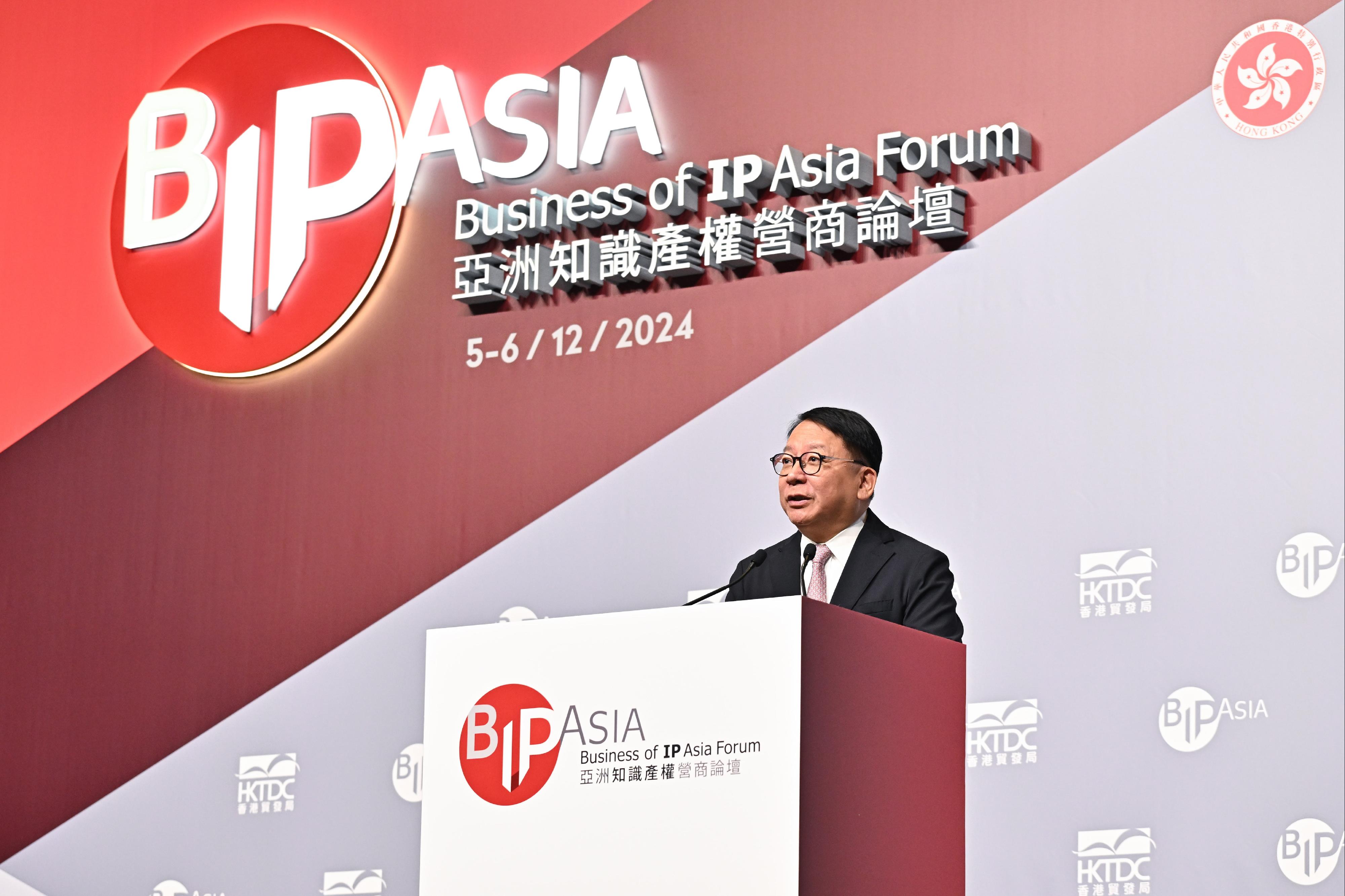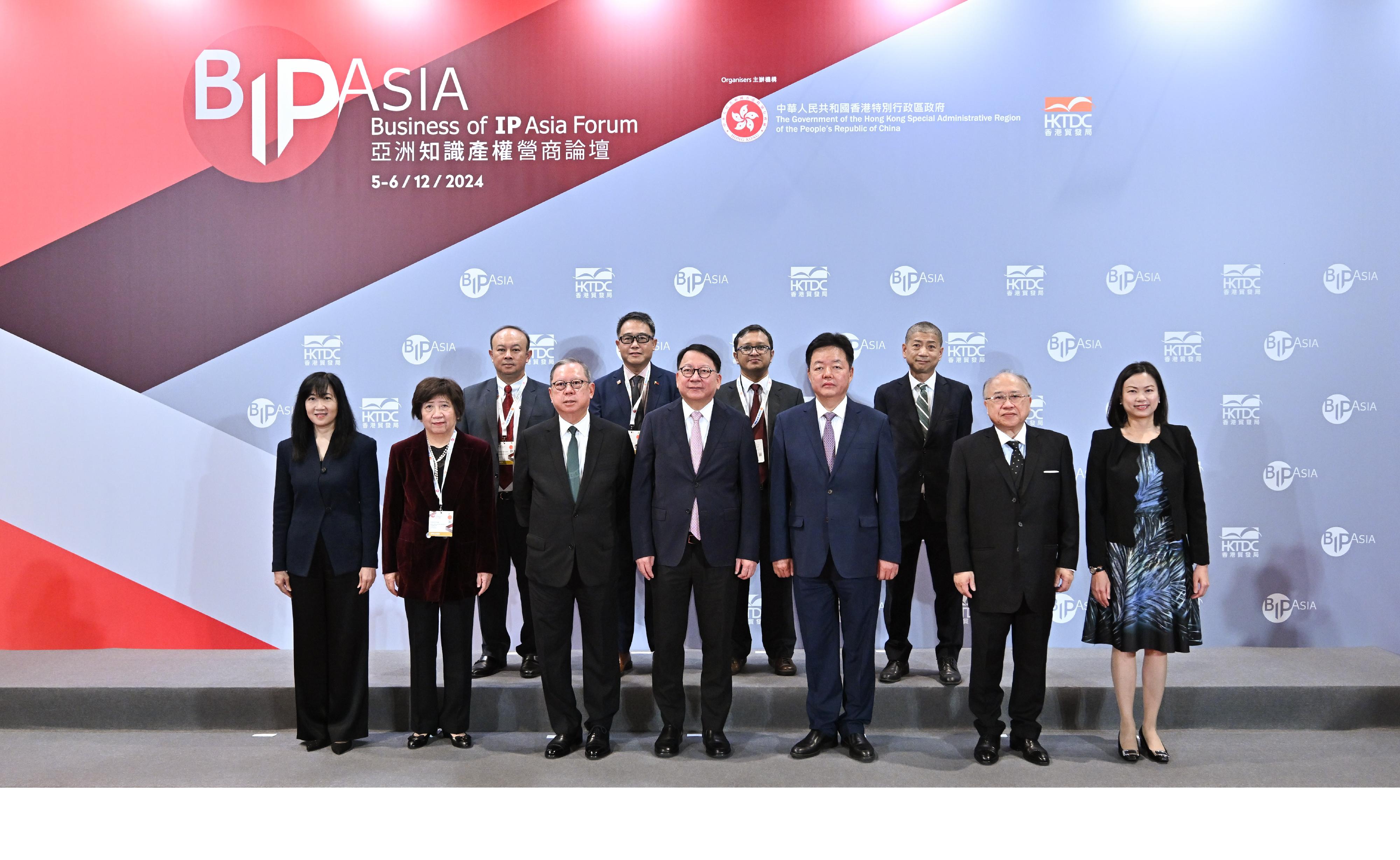Opening remarks by PSCED at Policy Dialogue Session of Business of Intellectual Property Asia Forum (English only)
Following are the opening remarks by the Permanent Secretary for Commerce and Economic Development, Ms Maggie Wong, at the Policy Dialogue Session of the Business of Intellectual Property (BIP) Asia Forum today (December 5):
Deputy Commissioner Hu (Deputy Commissioner of the China National Intellectual Property Administration Mr Hu Wenhui), Deputy Director-General Wang (Deputy Director-General of the World Intellectual Property Organization Ms Wang Binying), Chairman Norasingh (Chairman of the Association of Southeast Asian Nations Working Group on Intellectual Property Cooperation, Mr Xaysomphet Norasingh), distinguished guests, ladies and gentlemen,
It is a true honour to stand before such a distinguished gathering of intellectual property (IP) leaders, experts and practitioners from around the world. We are all here today because we share a common belief that IP, being a cornerstone of innovation, is a powerful engine driving economic growth, societal progress and entrepreneurial success.
The power of IP in a transforming world
At this critical juncture of global economic transformation, where technological advancements are accelerating faster than ever before, IP has become the bedrock that supports the creation, protection and commercialisation of ideas and innovation. The impact of IP on economic and social growth is profound, and our role as custodians of this system has never been more important.
Today, I am proud to share with you how Hong Kong is advancing as a regional IP trading centre. As a city that thrives on entrepreneurship and creativity, Hong Kong understands that a robust IP ecosystem is essential for nurturing new ideas and innovations, turning them into tangible products and services, and ultimately bringing them to the local and global marketplace.
Strengthening IP legal frameworks for innovation
Hong Kong’s innovation and technology sector and creative industries are brimming with potential, and we are taking concrete steps to strengthen the legal frameworks that protect the fruits of innovation and creativity. For example, as announced by the Chief Executive in his 2024 Policy Address, we will propose updates to the Copyright Ordinance next year to enhance the protection for artificial intelligence (AI) technology development. AI, as we all know, is transforming every walk of life across the globe, and ensuring that IP is safeguarded in AI-related development will be critical to fostering sustainable future social and economic growth.
In addition, we will be launching a consultation in 2025 to modernise our registered designs regime currently under review, ensuring that it remains robust and agile to meet the evolving needs of the local industries and digital economy.
To further enhance the IP landscape, we are also proposing legislative amendments to streamline the IP litigation processes, enabling the High Court to manage and hear such cases more efficiently.
These efforts reflect our commitment to ensuring that our IP framework remains responsive to the unique challenges posed by emerging technologies, making Hong Kong’s IP framework more accessible and attractive to innovators and businesses.
Leveraging technology for IP services
Beyond strengthening IP protections, we also focus on making the IP system more efficient and accessible. Next year, the Trade Marks Registry under the Intellectual Property Department will launch a new AI-assisted image search service, making it easier for the public and businesses to search our trademark database. This service will help streamline the trademark application process, encourage entrepreneurs to protect their brands and intellectual assets, and reduce barriers to entry for businesses seeking to expand their IP portfolios.
Furthermore, we are proud that with the support of the Central Government, Hong Kong will participate in the World Intellectual Property Organization Lex-Judgments Database next year. By sharing important IP case precedents of Hong Kong courts, it will showcase to the international community our IP jurisprudence and reinforce Hong Kong’s reputation as a leader in IP enforcement and dispute resolution.
Fostering an IP-savvy workforce
To foster an IP-savvy workforce, we are also partnering with the Qualifications Framework Secretariat to develop practical training materials across 23 industries and engaging with the patent agent sector to plan for the introduction of regulatory arrangements for local patent agent services. We will also double our efforts in IP education, outreaching to 200 000 students during this term of Government, up from our previous goal of 100 000. All these will provide personnel in a diverse range of sectors with the skills and knowledge needed to navigate the complexities of IP rights, equipping the next generation of innovators and entrepreneurs with the tools they need to thrive.
Conclusion: collaborating for a better tomorrow
As we look to the future, in an era defined by rapid technological change and digital transformation, IP will continue to shape the trajectory of our economies and societies in profound ways. The various programmes in this year’s BIP Asia Forum will provide a valuable platform for us to share our ideas, experiences and best practices, with the common goal to strengthen the global IP ecosystem and ensure that it remains responsive to the challenges and opportunities ahead.
With this note, let us make the best use of this Policy Dialogue Session to collaborate, innovate, and harness the power of IP for the benefit of all.
Thank you. read more






